…Another Autobiographical (too long?) Story
Note: The short essay linked at the end of this blog post is about today’s economy and uses the history of the Erie Canal as the example to make the author’s point about how important government involvement in science, engineering, and ‘development’ is. After reading it I decided to write what follows.
When I was twelve, my father took my mother, my four-year-younger sister, and me on his 36’ Chris Craft cabin cruiser from Duluth, Minnesota, down the Great Lakes, across the Erie Canal, then down the Hudson River to New York City. My brother Ken was only four at the time, so he was left in Duluth with trusted family friends. After arriving at the Big Apple, the four of us spent a few days at the 1965 NY World’s Fair, then drove home using a borrowed car. Some other guys my father knew had driven a station wagon to NYC and then enjoyed cruising his boat back to Duluth.
This trip took us around five weeks and remains one of the two most influential travel experiences of my life. The other was a three-month 1996 motorcycle ride from Duluth to Mongolia and back when I was forty-three. These bigger adventures caused a lifelong preference for self-made trips of any scale and length over all pre-packaged travel experiences. Watching my father manually and meticulously chart the next day’s courses on huge paper nautical charts at 11 PM after an exhausting fourteen- or fifteen-hour day running the boat was a lesson I’ve never forgotten. Children learn far more watching how their parents operate than from whatever lessons their parents are intentionally trying to teach them.
Every morning at six AM, dad would fire up the boat's two engines (marine-ized versions of V-8 Chrysler 383’s maybe?), and the only thing I remember about them was my assigned job of crawling down into the hot, cramped bilge to check their oil dipsticks every day. Us two children were sound asleep in the “V” bunk in the bow when he’d warm up those engines while disconnecting the ‘shore power’ and casting off the dock lines. We’d always be awakened by their noisy vibrations and still pajama-clad would groggily stumble up to the stern just as he’d throw both engines into reverse and start carefully backing away from whatever dock he’d found for us the night before. Then, still in my PJs, I’d climb up onto the narrow deck beside the cabin to pull up the fenders and stow the lines, and we’d be off for the day. Breakfast for his crew was made and served about an hour later, and the rest of the day was mostly spent watching the water and shorelines go by.
Sometimes, like when crossing Lake Erie, there were waves large enough to cause my sister to become seasick. Other times, like going through the Erie Canal, we could almost reach out and pet the cows calmly grazing in some farmer’s field right next to this waterway. Transiting locks was always fun, and each was a little different from the last. There must have been sixty or seventy of them between Duluth and the final one on the Hudson River. We’d started out at six hundred feet above sea level, and at the New York harbor, we were at elevation zero.
Dealing with the unknowns about whatever may be just ahead is a key part of all self-made travel experiences. The fun of that trip was the endless moment-by-moment encounters with the unknown. Some of this involved walking around little towns along the way and meeting locals and other boaters when looking for a laundromat and a grocery store. Other times, some unanticipated problem came up that needed solving before we could proceed. For example, one morning, just as we were backing out of some tiny marina, a carelessly handled stern line slipped into the water and became tightly wrapped around the starboard propeller and shaft. Several tries reversing that prop did not unwind it. Fortunately for us, this place had a boat lift, so on one idling engine, we very carefully motored over to it and an hour or two later were underneath the dripping wet hull, cutting away the line with a sharp knife. We were on our way again by ten or eleven. I don’t know if we made it to the next charted harbor with such a late start that day, but eventually we did get all the way to the Flushing Bay Marina in New York City.
“I have always found that plans are useless, but planning is indispensable.”
By then, we’d become experts at locking and general boat handling, but at the same time, my parents also had about enough of my sister and me after spending more than a month living with us in such close quarters. As always, Dad had a solution. He called a NYC cab from a pay phone that was conveniently mounted on the side of a pole at the end of the dock. When the cab driver arrived, he made a deal with the guy: “Here’s $50 (or something…). Take the kids to a movie.” I think he tore the bill in half and handed the smaller half to the driver. There were no cell phones, and this was a total stranger (and maybe that bill was the equivalent of several hundred dollars today…), but the cabbie was probably happy to get a break from driving that afternoon, and my parents appeared ok accepting the risk. I don’t remember what movie or double feature we saw, but after it was over, the driver brought us back to the marina and got the other half of the bill. Hard to imagine any parent doing something like that today (?), no matter how fed up with a kid they might be.

What came out of this experience (and my three-month Mongolia ride) was a very strong preference for self-made travel. Especially via motorcycle. I love the logistical and navigational challenges involved in being a mostly self-contained back-road vagabond. Of having a loose goal, and some good maps, and the lightweight camping and cooking equipment needed to bed down in some never-before-seen location, and the near-daily experience of walking into some little grocery store for provisions, and sometimes buying things like canned beans to be heated later, or a fresh submarine sandwich at a three PM gas stop to be eaten a few hours later comfortably sitting in front of a tent by a small campfire. Maybe even washed down with a lovely beer of some kind.
Experiencing and dealing with infinite unknowns ahead, mile after mile: All the perfect roads and the terrible roads. The odd little towns and sometimes unbelievable scenery. The sometimes capricious weather, from perfect to horrible. I’m now seventy-two, and I’m still able to manage such trips, but only just barely. My bike of choice is a bit smaller and lighter, and the kit I pack along is more refined and smaller and lighter as well, but the goals are exactly the same. They’ve never changed: Carry as little as is necessary while also being as comfortable and safe as possible within the constraints of ’traveling light’. Today’s smartphones and GPSs have been very worthwhile add-ons, but these powerful technologies have never been absolute essentials.

What a lifetime of motorcycle trips has taught me is that having the gear necessary to meet the more predictable logistical challenges depends on the details of each particular trip. Consider pooping. Will you always be near restrooms along the way, or will you need to dig a hole behind a bush somewhere to do your business? Will you need a lightweight folding shovel, or will some small plastic or aluminum hand spade be effective enough for the types of soil you project you might need to deal with? So many questions. These are fun riddles to think about and solve. Each is a thread from which you are weaving a tapestry of memories, day by day and hour by hour, whenever you travel with only a loose plan as a backroad moto-vagabond. And after you take the first step of any journey, boy-oh-boy, does all this ever make you feel alive.
Cruise ships and pre-planned motorcycle (and other) tour experiences can be wonderful, but gee whiz, do I ever prefer solving all the problems that come before me on unknown roads and trails. So thanks, Dad. We sure had our differences, and plenty of them, but when I look back at my life today, I wish you and Mom were somehow still around. Especially so you could have met my wife. She’s another hard-working, self-made real-world problem solver. Just like you.
-- Mr. Subjective, Oct 28, 2025
PS – This link is to the complete Substack essay about the Erie Canal that had me remembering that family trip. The writer of the Substack is a PhD college professor who teaches history at a university up in Maine, and she’s very skilled. If you have the time and are curious, you’ll learn some history that probably was glossed over or which you slept through back when you were a student. Basic subscriptions (which is what I receive) are free. Before you sign up, though, note that many of the essays involve tying US historical events to current and ongoing history-impacting events. Regardless, and trying to ‘stay in my lane’ here, she’s a very good writer and historian.
PPS – Kids do not get to choose their parents. In this ‘boat trip’ story, I briefly touched on how children learn a lot more from their parents by watching how they operate, rather than from anything parents intentionally attempt to teach. At one extreme are those parents so hands-off that their self-directed kids become intuitive problem-solving adults, which (for better or worse) is partially what happened to me. At the extreme end of this parenting spectrum is the Johnny Cash hit song “A Boy Named Sue” which is a funny-wonderful ballad about this. At the other end are what have recently been called ‘helicopter parents’, those who, though well-intentioned, do so much for their kids such children can turn out ‘book-smart’ but not super able to take care of themselves so well as adults. Somewhere along this continuum is a happy medium, and if you were fortunate to have received such parenting, be grateful. Regardless of where your parents fell along that spectrum, riding a motorcycle frequently might be one of the best things you can do for yourself because it forces you to solve a very wide range of immediate and pressing logistical problems. Every time you wobble off on two wheels, you are on your own, taking care of yourself. You may encounter bad weather, heavy traffic, or challenging terrain (or all this at the same time!) before you reach your destination. Riding provides such problem-solving lessons every time you throw your leg over the saddle and head off somewhere. No other personal mobility technology is so practical, so useful, and so much fun as it teaches you the attitudes and skills which transfer so usefully to every other area of your life, and which you can be proud of mastering.
PPPS – One part of the Aerostich business has been to supply and support riders who like to explore some very distant locations and cultures. Many have shared great stories and images of their experiences, and I’ve become friends with a few of these riders, including several whom we’ve been able to help sponsor with Aerostich gear. Most recently Anna O'Neil (see her Facebook page). Most of these stories are now shared via books and online videos. The videos have become so numerous that it is impossible to view even a small fraction of them. Among the best are those made by a Dutch woman, Noralee Schoenmaker (www.itchyboots.com), who has been creating and sharing her motorcycle trip stories for (at this writing) eight years. She recently reached three million YouTube subscribers, and to celebrate and thank her supporters, she’s made a wonderful video summarizing the length and breadth of her experiences, which you can watch here, for free. Her story fits right in with the experiences and ideas I’ve described here.





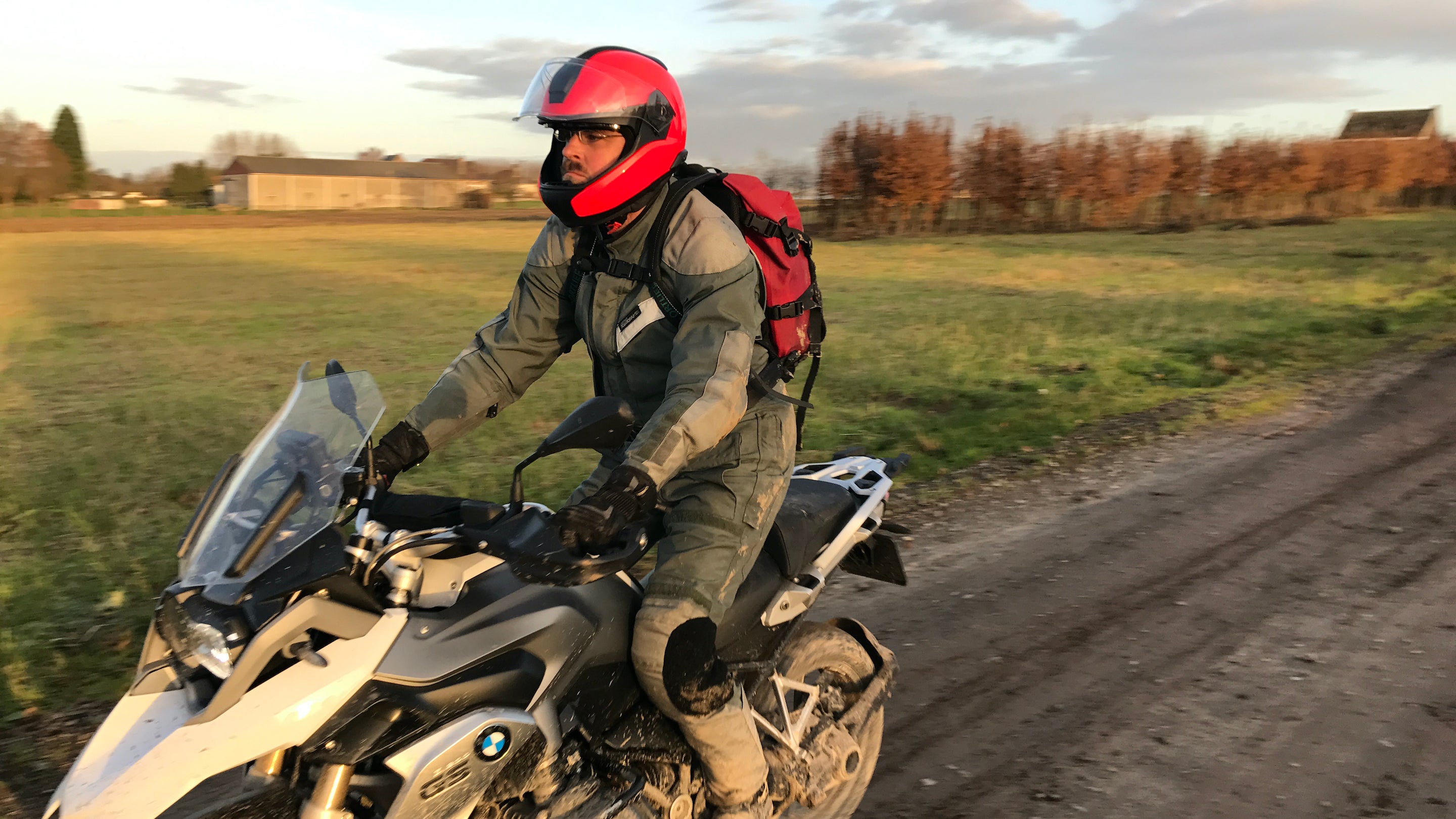

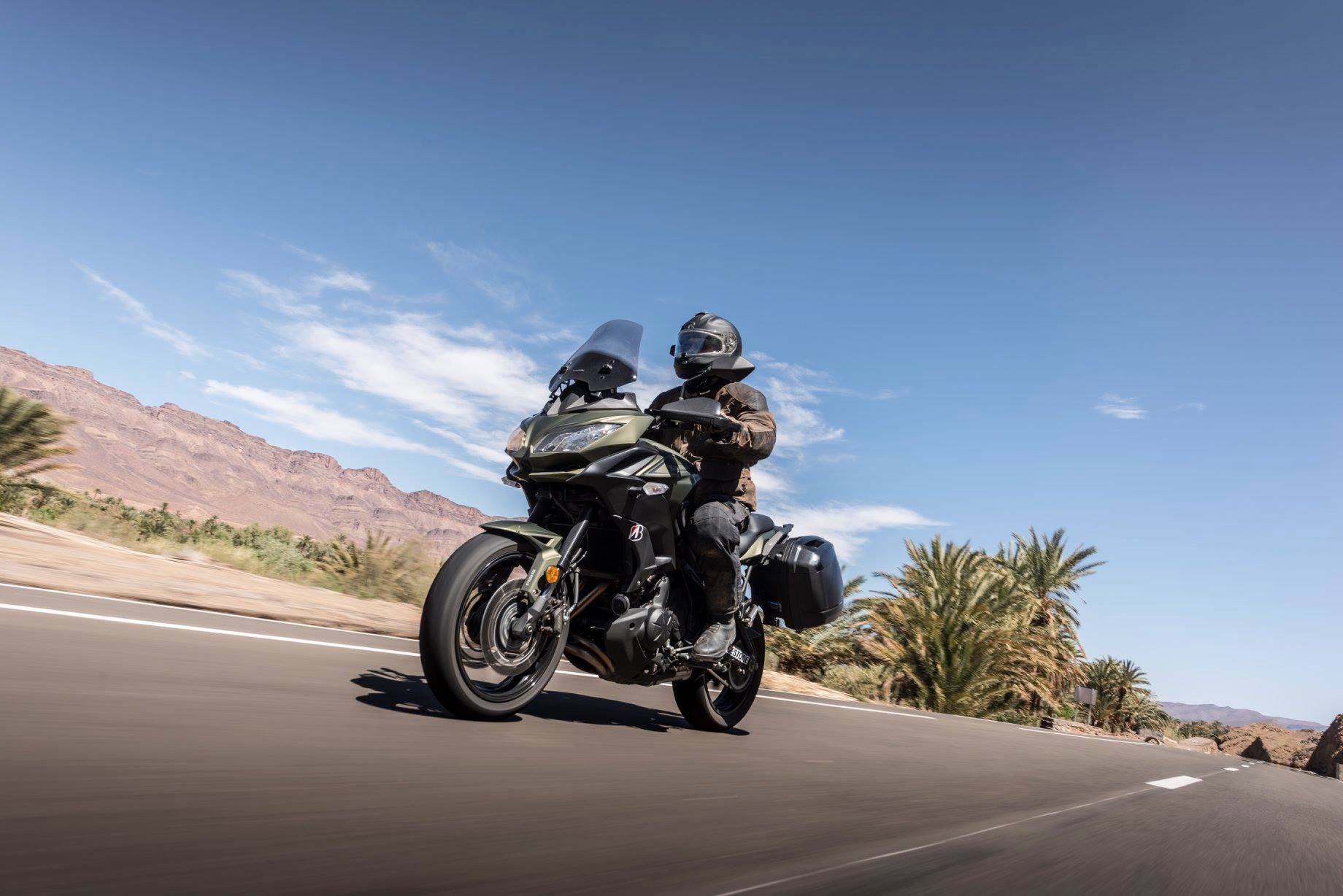
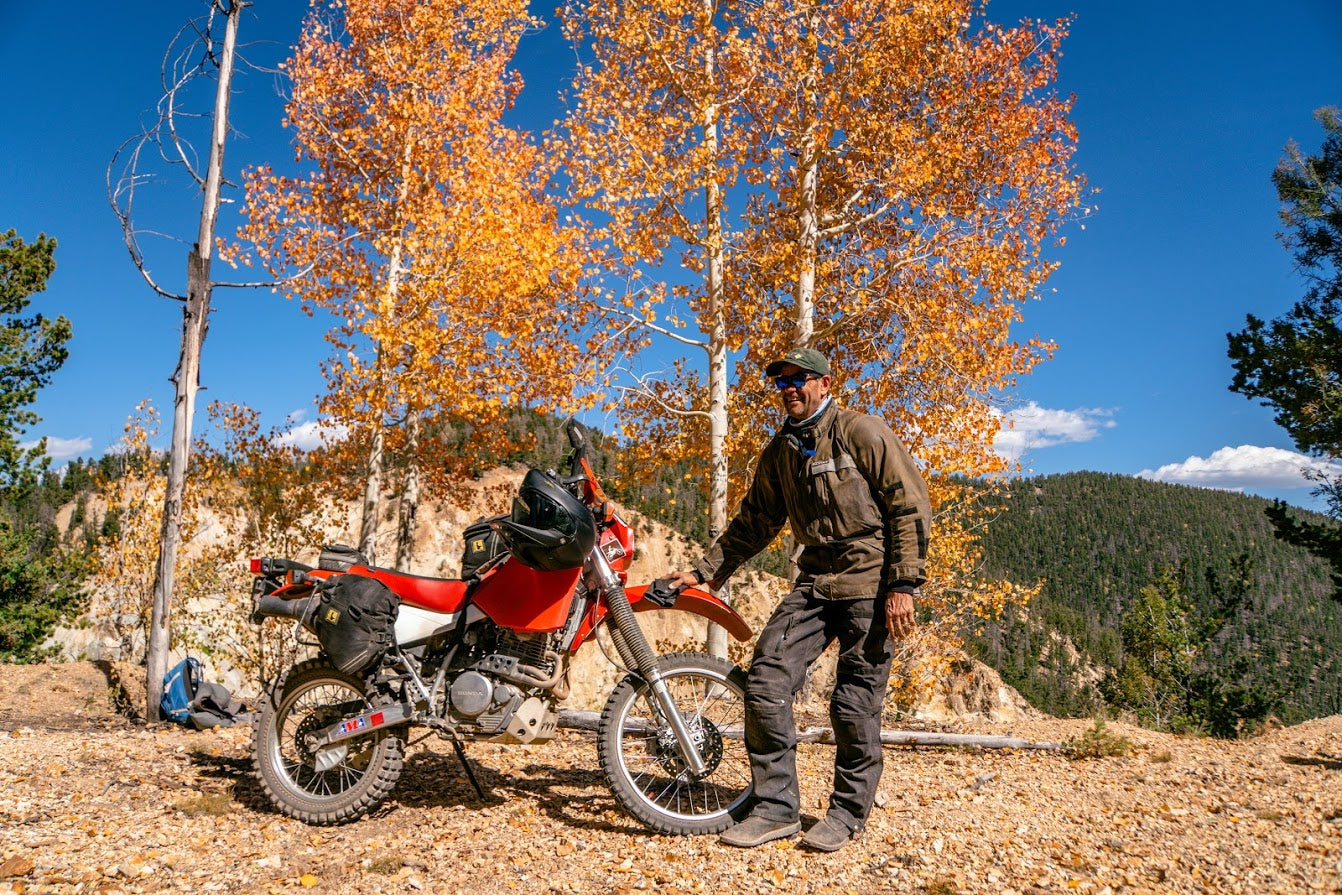

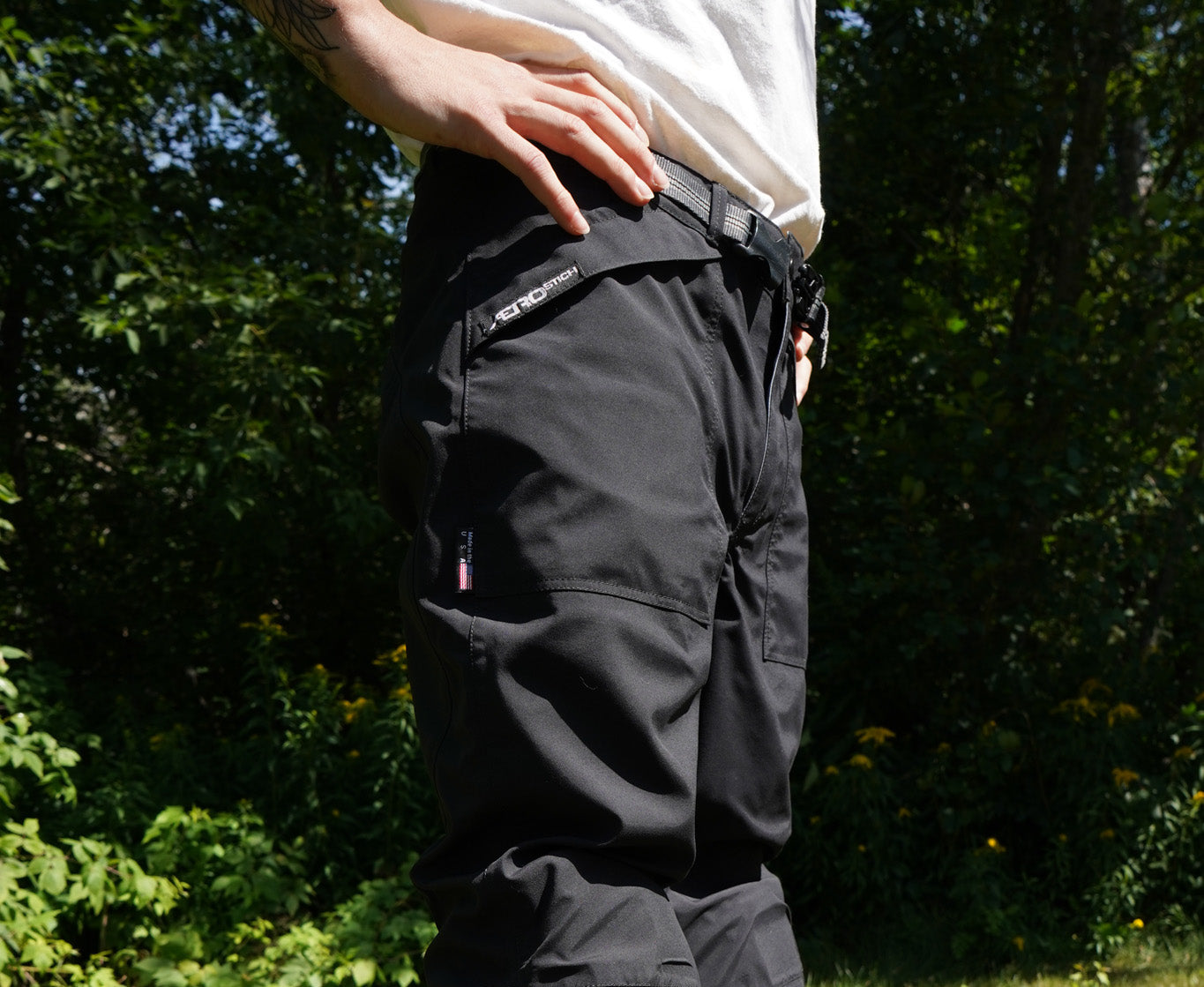
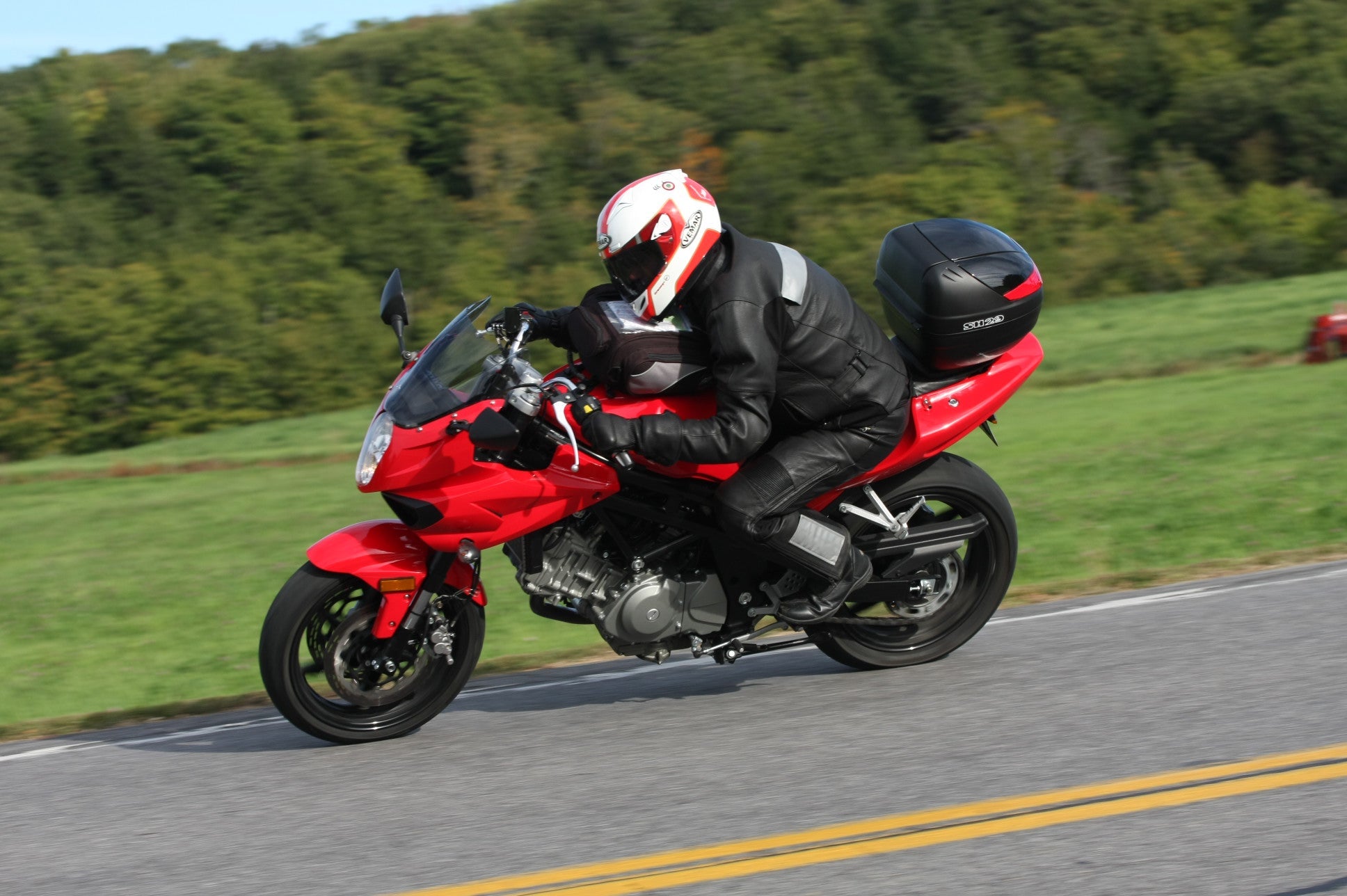






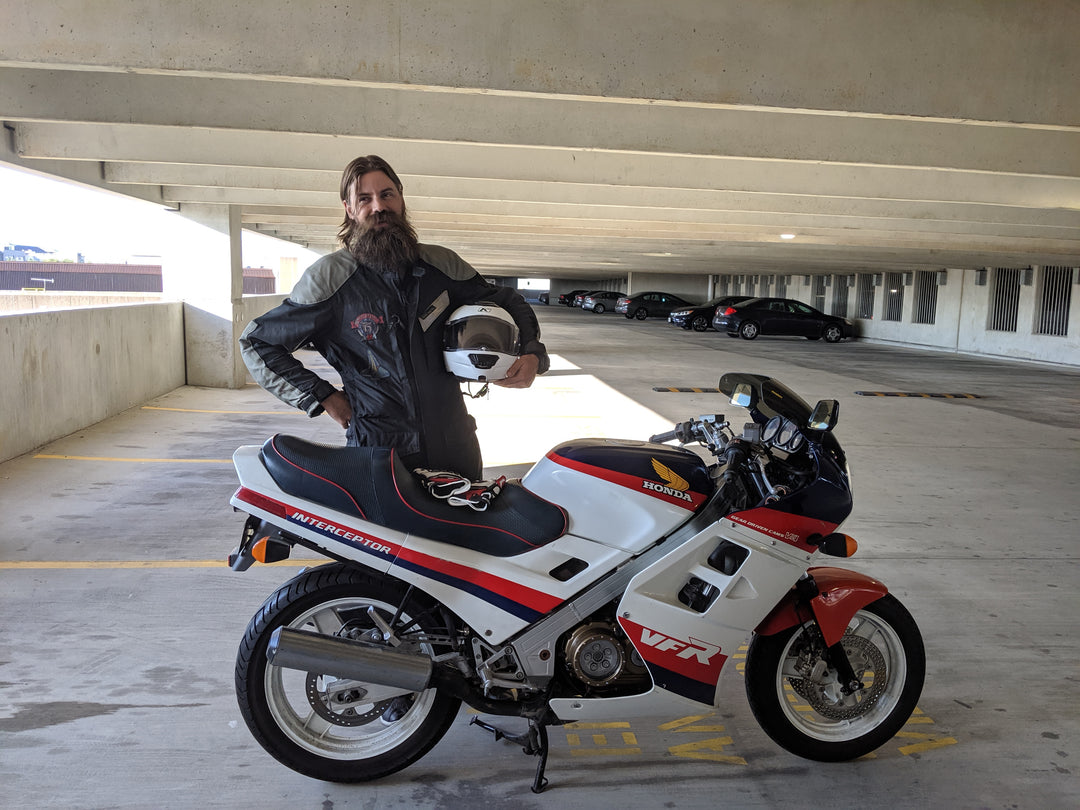
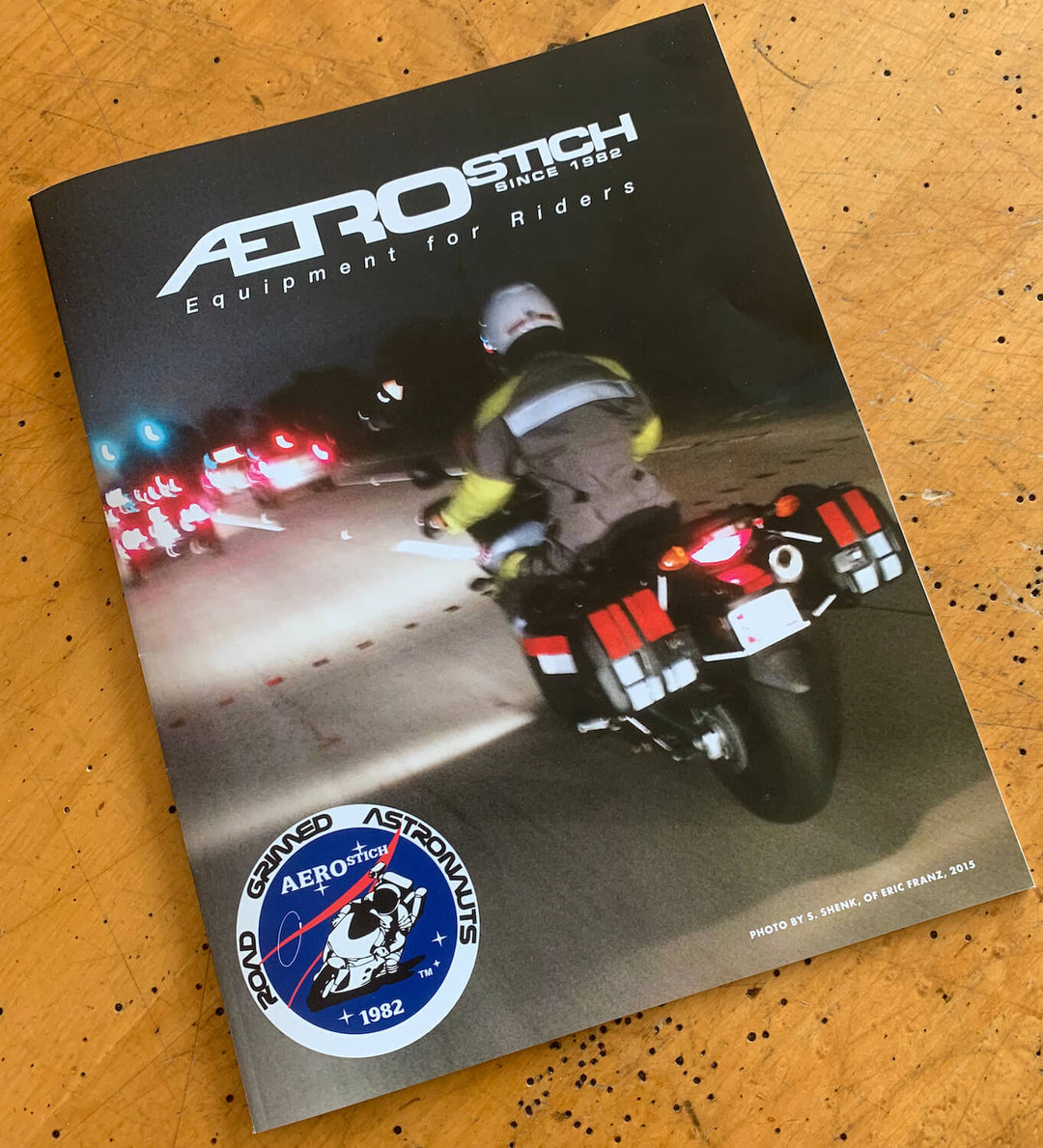
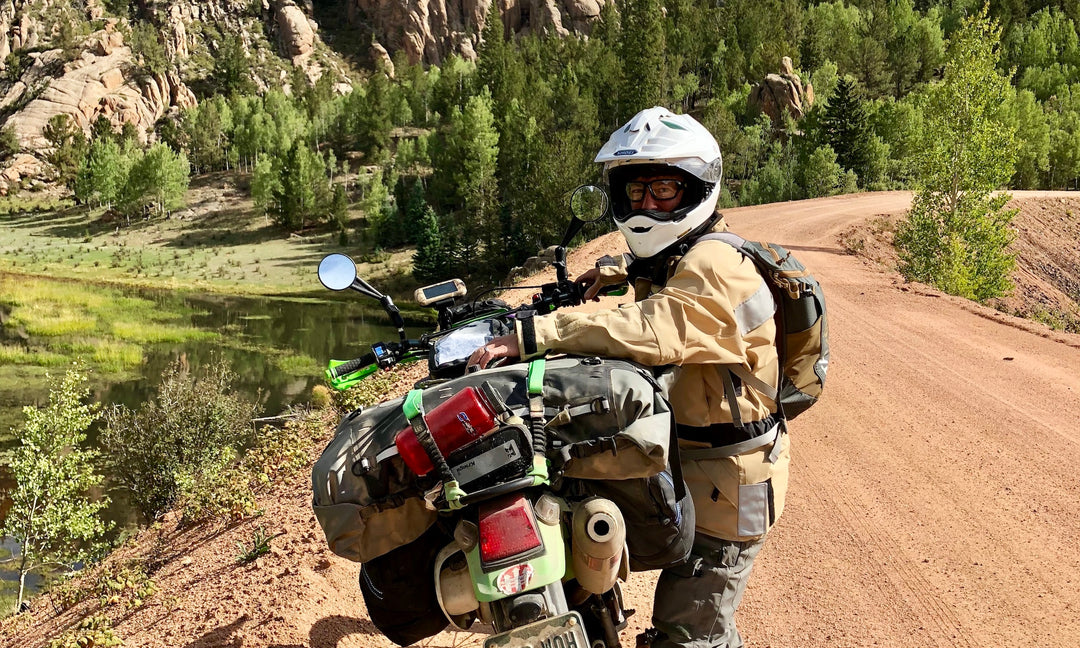
My childhood was also boats, but mostly Lake Michigan. By the time I was in high school, we had a 32’ cabin cruiser with twin 351 Mercs and my dad would run us from Milwaukee to Door County and the UP each summer for most of a month. One morning we left Two Rivers and an engine died, and while problematic, not a Coast Guard call. We pulled up the floor and I happened to notice a spark at the coil while cranking, and I found the coil was cracked at the wire and grounding out instead of sending electricity to the plugs. So I grabbed some electrical tape to cover up the crack and off we went like nothing happened. We got a new coil in Sturgeon Bay and never had another problem the whole trip.
My dad was a car-guy most of his life before I was born, so to be a teen with maybe one year of high school auto shop who solved the problem before him made me immensely proud. I’m quite sure he was beaming, too. I moved west 30 years ago, but I still love and fondly remember the Great Lakes maritime vibe.
Almost without fail, those who wander about on two wheels, make any room they enter a bit more interesting.
Just like T.W. Day mentioned in his comments above, motorcycle riders know that they have been places, met people, and seen things that most people have never even dreamed of.
On my trips to, and through the Yukon, Alaska, and the Northwest Territory to Inuvik, I relied on paper maps from AAA that had been folded, refolded, and highlighted into submission, gently stuffed into the tank bags clear top pocket to be referenced innumerable times.
Riding through early morning chill, mid-day heat, gale force Wyoming winds, and cold soaking rains, changes a person. As does relying on ones own wits when it comes time to finding a safe campsite each night.
Through my travels, my carefully selected RiderWarehouse and Aerostitch gear have served me well. Thank you.
And “yes”, please put your thoughts and essays in a book. We ‘wanderers’ need it.
Certainly in no small part, Aerostich gear contributed to several hundred thousand confident miles on a variety of motorcycles from the early 80s (Honda CX500) to my last bike, which I sold last fall, (Suzuki TU250X). Other than the freezing kind, weather was never an intimidating factor on my trips across this continent because I knew my ’Stich gear would not let me down.
When I retired in 2013, it didn’t occur to me that in a few years old age medical issues would bring my two-wheeled life (at least on motorcycles) to a shuddering, double-visioned end a lot sooner than later. Today, at 77, I can look back at those “adventures” (“adventures are what happens when your plans fail”) fondly and know that I have been places and done things that “ordinary people” don’t even know they should be dreaming about.
gratefully,
A lifelong Aerostich fanatic
Thanks Andy, great story I had forgotten about the old timers growing up that would tear money in half and give you the other part when the deal was done, then you had to go to the bank and tell that you accidently tore the bill and would like to have a good one to replace it. In 2024 I did a motorcycle tour with a friend in the Alps of Europe – never got it the American and Canadians rented big 1250 and 1300 BMWs for tight and twisty roads, I was on a 700 Yamaha that did really well and a lot more fun. Went back this year 2025 Sept, with just my friend Bill, No plans just the rentals I road a 800 F800GS great bike, no reservations carry all our gear, it was a lot more fun finding great roads and hoping you would find a hotel that night.Bill had been before and had a Cardo Edge and after looking a maps and knowing where we wanted to go he told his smart phone and lt Siri talk to him-he did a really good job with navigation this way. The last day back we rode 5 hours on the Autobahn 3 of the hours in the rain. Growing up in the LA area we had always heard that people drove 140-160 mph, I found that you would get the person once in a while that was a 120mph, but for the most part it was 85-95 just like home on I-210, except they would not stay in the # 1 lane at 63MPH like here. When I was with the tour group in 2024 they only took us to really nice places, when we did our own ride in 2025 it was a lot more real world, and I came back this time happy to be in the USA. I agree 100% just winging it can be much more of an adventure, It was amazing that I was able to get away with just speaking English and a piece of plastic(credit card) about 95% of the time.
Mr. Subjective, as usual; spot on. Thank you for sharing. My dad had a 30 something Chris Craft cabin cruiser. I believe it had a pair of Chevy 283’s. Sincerely, a customer and loyal reader.
Leave a comment